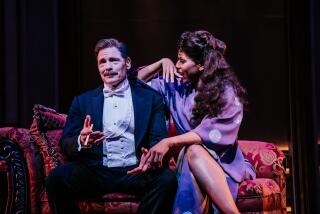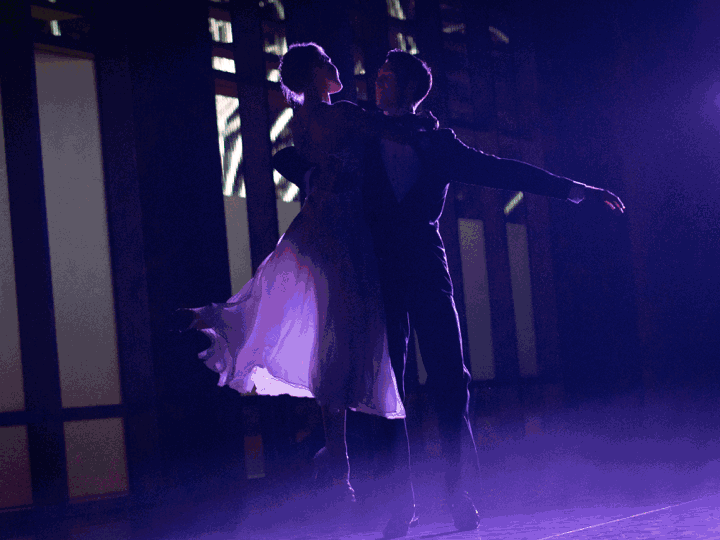A Night at the Movies: Isn’t It Romantic?
- Share via
Recently my wife and I drove downtown to see a revival of the movie “Love Me Tonight” at the old Million Dollar Theater.
It was an evening heavy with nostalgia.
The Million Dollar Theater was one of the several Broadway theaters I frequented as an adolescent, and I probably saw “Love Me Tonight” on Broadway, if not at the Million Dollar, when it was first released in 1932.
Rouben Mamoulian directed the movie for Paramount. Samuel Hoffenstein was among the writers; Richard Rodgers and Lorenz Hart wrote the songs. As Leslie Halliwell observes, “It was the most fluently cinematic comedy musical ever made, with sounds and words, lyrics and music, deftly blended into a compulsively and consistently laughable mosaic of sophisticated nonsense . . . .”
I realized, as I watched the film on the Million Dollar screen, that it was exactly this kind of romantic sophisticated nonsense that had shaped me in my formative years. The kind of man I became I probably owed in large part to “Love Me Tonight” and its imitators.
Today’s generation of parents often expresses its dismay over the kind of movies made for its children. Teen movies today are loaded with frankly sexual situations, obscene language and cynical rebellion.
In 1932 the movies taught us adolescents that life was wondrous, true love was virtuous and beyond the constraints of class, and everybody was happy, or soon would be.
The facts of our times were hard. We were stuck in the Great Depression. Most of us were poor. The rich, as F. Scott Fitzgerald had pointed out, were different. The movies were our fairy stories.
“Love Me Tonight” is set in France. That was long before any of us ever dreamed of going there by jet. It opens with dawn over Paris. We see a gauzy Eiffel Tower through the mist; a bridge over the Seine; a street scene. Shutters open. Women appear in windows, shaking out their bedspreads. Shopkeepers throw back their doors. A boot maker sets up his last and begins tacking heels on boots. The fruitier sets out his wares. The city comes to life. The young Maurice Chevalier awakens in his garret and dons slacks, turtle neck and rakish cap. Singing, he goes out into the street to his tailor shop.
He sings “Isn’t It Romantic?” A customer picks it up and takes in into the street. Soon everyone in Paris is singing “Isn’t It Romantic?” and we in the audience are convinced that indeed it is.
Meanwhile, Jeannette MacDonald, a princess widowed of her aged husband, pines for young love in her enormous castle. How can the princess and the tailor be brought together? Easy. He hires a car to take him to the castle to collect his bill from the duke’s deadbeat nephew. MacDonald comes singing through the woods on horseback and falls conveniently by the car, which has conveniently broken down. Chevalier falls instantly in love, as I did. He sings “Mimi” to her, and is rewarded with a slap. She trots haughtily off.
Chevalier is introduced by the embarrassed nephew as a baron. MacDonald soon falls in love with him. There is much romantic singing. Chevalier scoffs at her old-fashioned riding habit and offers to sew her a new one. In a scene that must have scandalized them in 1932, he rips off her habit, leaving her in her teddy, and takes her measurements, including the bust. Of course he is exposed as a tailor--an unsuitable mate for a princess.
The entire household is shocked by this discovery. “A tailor!” they sing. “He’s nothing but a tailor!” MacDonald joins in this renunciation, and Chevalier leaves the castle, catching a train for Paris.
MacDonald has second thoughts. What has she done! Spurned her lover because of class distinctions! She saddles up and rides to catch up with the train. The engineer refuses to stop. She rides ahead, jumps down and stands on the tracks. The train stops, Chevalier jumps out, and true love triumphs.
Do you believe that?
Well, I believed it. In 1932 I believed that true love was the most powerful force on Earth; that it could surmount all obstacles. That if one were patient, it would come.
I don’t mean to suggest that I did not in time find true love; but I wonder if the path might not have been less excruciating if I had been raised on today’s movies, instead of “Love Me Tonight.”
More to Read
Only good movies
Get the Indie Focus newsletter, Mark Olsen's weekly guide to the world of cinema.
You may occasionally receive promotional content from the Los Angeles Times.










